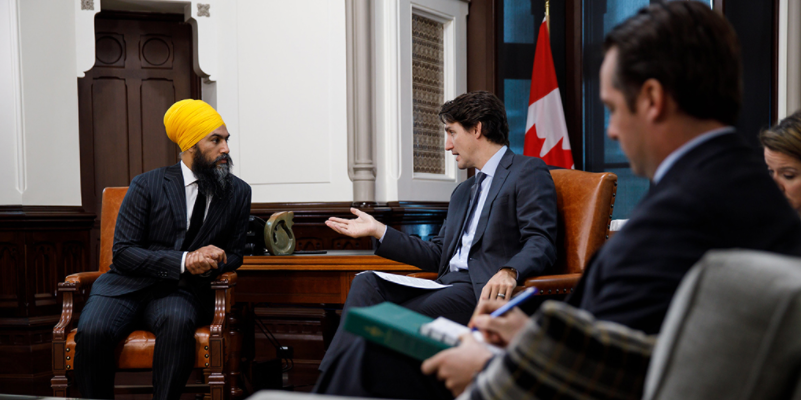The historic agreement struck between the ruling Liberals and the New Democratic Party raises many questions. It has met criticism from the right and the left, and there are many different views of what this will mean for politics and social justice.
Let’s examine the details, and have a passionate debate about where the accord leads Canada.
When I was an apprentice, there was an old Cape Breton carpenter who would greet me with a warm smile and a wry question – “what have you done today to justify your existence?” It’s a good question for all of us, and an essential question for political parties and social justice movements. Do the features of this accord justify it’s existence? I’d say it all depends on what we do with it.
We have just marked two years of the COVID pandemic that cost thousands of lives and shut down much of the economy. There were crucial decision points during the COVID crisis, with a mass movement calling for a Just Recovery for All.
The federal government stepped up with spending levels unheard of since the Second World War to stabilize the economy and support people and businesses, while conservative provincial premiers did as little as possible. Corporate Canada is now back to its traditional mantra that public spending must be curtailed and taxes reduced.
There is no doubt that people are desperate to get their lives back – hence the widespread sympathy for the “convoy movement”. It coalesced as a vanguard of the right-wing movement – helping to take out O’Toole in favour of Poilievre; and landing like a “grenade in the room” to disrupt the momentum towards a low-carbon future. Its boldness combined with immense fundraising ability reminds us that a small group named the Tea Party helped turn the grievances of millions of Americans into Donald Trump’s triumph.
The accord was partly a response to that dangerous dynamic. But let’s be clear – this deal didn’t come out of thin air. All the items in the accord were the result of decades of struggle by Canadians. The Liberal and NDP platforms included housing, childcare, fair taxation, and long-term care. There have been massive ongoing campaigns on Pharmacare and Childcare. Liberal delays on Just Transition sparked rallies last month at fifty MP’s offices demanding action. And the call for paid sick days has been relentless since the start of the pandemic.
People win victories when we build mass movements and combine grass-roots mobilization with a inside/outside strategy to elect champions and engage decision-makers. Tommy Douglas is heralded as the father of Canadian Medicare, but there’s a plaque in Windsor that tells a deeper story. Autoworkers highlight a strike in the 1950’s that won the first workplace health plan for industrial workers – and a pledge to never rest until all Canadians had healthcare as a right. It was the courage of people building a powerful mass movement that set the stage for universal healthcare. Perhaps we can complete that dream by winning public pharmacare and dental care.
There are other lessons from the past. George Manuel, facing the brutal intransigence of the Canadian state, helped found the World Indigenous Council to even up the odds – creating a powerful alliance that spanned the globe and pilloried Canada at the United Nations. Decades later, UNDRIP is a central principle that has won moral and legal authority to replace the doctrine of discovery.
The Council of Canadians has led dynamic campaigns to defend water against privatization, bulk export, bottling and industrial pollution. Those were multi-faceted efforts with a wide range of allies and tactics that raised the principle of the Human Right to Water at a global scale. The childcare movement has just won a deal encompassing thirteen different governments, the first new national social program in decades.
The accord includes language on the climate emergency, the housing crisis, paid sick days, fairer taxes, and even voting rights. Could it have been better? Of course! The question is what do we do with it. How can we use the accord to force those in power to deliver on key demands. We should fight for more – and say no to an obscene level of arms spending. Let’s have a full debate on every aspect of this accord.
But all of us will be judged on our ability to actually win and secure key public programs that serve generations to come. In other words, its up to all Canadians to close this deal – or win an even better one.
This article first appeared on The Council of Canadian’s website.



